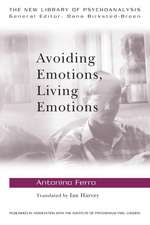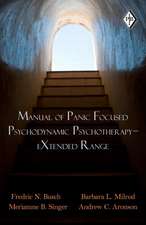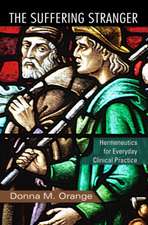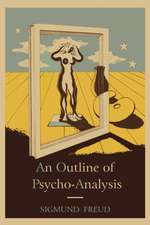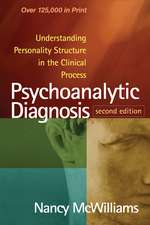The Analyst in the Inner City: Race, Class, and Culture Through a Psychoanalytic Lens: Relational Perspectives Book Series
Autor Neil Altmanen Limba Engleză Paperback – 6 oct 2009
Much like the original, this second edition of The Analyst in the Inner City opens up with updated, detailed clinical vignettes and case presentations, which illustrate the challenges of working within this clinical milieu. Altman greatly expands his section on race, both in the psychoanalytic and the larger social world, including a focus on "whiteness" which, he argues, is socially constructed in relation to "blackness." However, he admits the inadequacy of such categorizations and proffers a more fluid view of the structure of race. A brand new section, "Thinking Systemically and Psychoanalytically at the Same Time," examines the impact of the socio-political context in which psychotherapy takes place, whether local or global, on the clinical work itself and the socio-economic categories of its patients, and vice-versa. Topics in this section include the APA’s relationship to CIA interrogation practices, group dynamics in child and adolescent psychotherapeutic interventions, and psychoanalytic views on suicide bombing.
Ranging from the day-to-day work in a public clinic in the South Bronx to considerations of global events far outside the clinic’s doors (but closer than one might think), this book is a timely revision of a groundbreaking work in psychoanalytic literature, expanding the import of psychoanalysis from the centers of analytical thought to the margins of clinical need.
| Toate formatele și edițiile | Preț | Express |
|---|---|---|
| Paperback (1) | 318.23 lei 3-5 săpt. | +24.86 lei 4-10 zile |
| Taylor & Francis – 6 oct 2009 | 318.23 lei 3-5 săpt. | +24.86 lei 4-10 zile |
| Hardback (1) | 1103.82 lei 6-8 săpt. | |
| Taylor & Francis – 6 oct 2009 | 1103.82 lei 6-8 săpt. |
Din seria Relational Perspectives Book Series
- 5%
 Preț: 288.36 lei
Preț: 288.36 lei - 5%
 Preț: 227.31 lei
Preț: 227.31 lei - 5%
 Preț: 248.39 lei
Preț: 248.39 lei - 5%
 Preț: 316.44 lei
Preț: 316.44 lei - 5%
 Preț: 309.04 lei
Preț: 309.04 lei -
 Preț: 266.64 lei
Preț: 266.64 lei -
 Preț: 229.70 lei
Preț: 229.70 lei - 5%
 Preț: 231.83 lei
Preț: 231.83 lei - 5%
 Preț: 267.45 lei
Preț: 267.45 lei - 5%
 Preț: 301.77 lei
Preț: 301.77 lei - 5%
 Preț: 273.23 lei
Preț: 273.23 lei - 5%
 Preț: 331.65 lei
Preț: 331.65 lei - 5%
 Preț: 189.76 lei
Preț: 189.76 lei -
 Preț: 273.84 lei
Preț: 273.84 lei - 5%
 Preț: 289.39 lei
Preț: 289.39 lei - 5%
 Preț: 231.83 lei
Preț: 231.83 lei - 5%
 Preț: 940.25 lei
Preț: 940.25 lei - 5%
 Preț: 232.77 lei
Preț: 232.77 lei - 5%
 Preț: 275.63 lei
Preț: 275.63 lei -
 Preț: 213.39 lei
Preț: 213.39 lei - 5%
 Preț: 274.21 lei
Preț: 274.21 lei - 5%
 Preț: 233.27 lei
Preț: 233.27 lei - 5%
 Preț: 315.51 lei
Preț: 315.51 lei - 5%
 Preț: 287.16 lei
Preț: 287.16 lei - 5%
 Preț: 219.18 lei
Preț: 219.18 lei -
 Preț: 371.53 lei
Preț: 371.53 lei - 5%
 Preț: 253.45 lei
Preț: 253.45 lei - 5%
 Preț: 183.34 lei
Preț: 183.34 lei - 5%
 Preț: 266.90 lei
Preț: 266.90 lei - 5%
 Preț: 274.82 lei
Preț: 274.82 lei - 5%
 Preț: 346.04 lei
Preț: 346.04 lei - 5%
 Preț: 219.50 lei
Preț: 219.50 lei - 5%
 Preț: 231.91 lei
Preț: 231.91 lei - 5%
 Preț: 324.12 lei
Preț: 324.12 lei - 5%
 Preț: 401.89 lei
Preț: 401.89 lei - 5%
 Preț: 332.28 lei
Preț: 332.28 lei - 5%
 Preț: 534.99 lei
Preț: 534.99 lei - 5%
 Preț: 323.32 lei
Preț: 323.32 lei -
 Preț: 336.72 lei
Preț: 336.72 lei - 5%
 Preț: 416.67 lei
Preț: 416.67 lei - 5%
 Preț: 425.09 lei
Preț: 425.09 lei - 5%
 Preț: 456.44 lei
Preț: 456.44 lei - 5%
 Preț: 464.96 lei
Preț: 464.96 lei - 5%
 Preț: 382.83 lei
Preț: 382.83 lei
Preț: 318.23 lei
Preț vechi: 334.98 lei
-5% Nou
Puncte Express: 477
Preț estimativ în valută:
60.90€ • 66.13$ • 51.16£
60.90€ • 66.13$ • 51.16£
Carte disponibilă
Livrare economică 01-15 aprilie
Livrare express 15-21 martie pentru 34.85 lei
Preluare comenzi: 021 569.72.76
Specificații
ISBN-13: 9780881635003
ISBN-10: 0881635006
Pagini: 396
Dimensiuni: 152 x 229 x 20 mm
Greutate: 0.54 kg
Ediția:2Revizuită
Editura: Taylor & Francis
Colecția Routledge
Seria Relational Perspectives Book Series
Locul publicării:Oxford, United Kingdom
ISBN-10: 0881635006
Pagini: 396
Dimensiuni: 152 x 229 x 20 mm
Greutate: 0.54 kg
Ediția:2Revizuită
Editura: Taylor & Francis
Colecția Routledge
Seria Relational Perspectives Book Series
Locul publicării:Oxford, United Kingdom
Public țintă
Postgraduate, Professional, and Professional Practice & DevelopmentCuprins
Introduction. Part I: Background. Clinical Experiences from a Public Clinic. Theoretical, Historical, and Sociological Background. Part II: Race, Class, and Culture. Social Class. Whiteness. Psychoanalysis in Black and White. Culture, Ethnicity, and Psychoanalysis. Part III: Thinking Systematically and Psychoanalytically at the Same Time. A Psychoanalytic Look at the Bifurcation of Public and Private Practice. Thinking Systematically and Psychoanalytically at the Same Time: Psychoanalyzing the Context. Toward Overcoming the Split between the Psychic and the Social: Bringing Psychoanalysis to Community-based Clinical Work. A Psychoanalytic-systemic Perspective on Psychotherapy with Children and Families. Part IV: Psychoanalysis and Society. Manic Society: Toward the Depressive Position. Psychoanalysis in the Political World: The Case of the American Psychological Association and Torture. Psychoanalysis in the Political World: Suicide Bombing. Psychoanalysis as a Potential Force for Social Change.
Notă biografică
Neil Altman, Ph.D., is an Associate Clinical Professor in the Postdoctoral Program in Psychotherapy and Psychoanalysis at New York University, co-editor of Psychoanalytic Dialogues and co-author of Relational Child Psychotherapy. He is Past President of the Section on Social Responsibility of Division 39 of the American Psychological Association, and serves on the Board of the International Association of Relational Psychoanalysis and Psychotherapy. He is a founding board member, consultation group leader, and therapist in Fostering Connection, a program that offers pro bono psychotherapy to foster children.
Recenzii
"It was predicted that The Analyst in the Inner City would become a classic. It has. In this second edition, Neil Altman expands his exploration of the vexed relationship between psychoanalysis and race, class, gender, and community as these are shaped by broad social and political forces. The book expresses a rare combination of experience at the coal face, highly sophisticated theoretical analysis, scholarly research, and thoughtful, ethical reflections on the challenges to psychoanalysis of otherness and similarity. Altman's focus on a three-person psychology promotes a lived practice in the clinic that takes account of diversity while holding the analytic frame as universally relevant. He hereby brings the social and the political into the clinic as illustrated by cogent case examples. In his astute analysis of suicide bombings and torture informed by Klein, object relations, and intersubjectivity, Altman reciprocally brings the analytic to bear on the political. He again does so with an authority borne of experience given his pivotal role in organizing opposition to psychologists' collusion with detention centers. Neil Altman is a person of stature and this interesting, informative, illuminating, and deeply ethical book is a testament to this." - Gillian Straker, University of Sydney, Australia
"The Analyst in the Inner City shatters assumptions and brings penetrating light to our understanding of psychological life at the social margins. Utilizing the power of an exquisitely attuned clinical sensibility, Altman provides us with a masterful blend of intimate therapeutic engagement and incisive theoretical conceptualization, thereby bridging the gulf that all too often occludes our ability to see complex social issues simultaneously as interior, subjective realities and as "objective" forces that act on us and shape our understanding of ourselves and those around us. This groundbreaking work should be required reading in the mental health disciplines as well as social scientists working at the intersections of race, social class, and culture." - Ricardo Ainslie, author, Long Dark Road: Bill King and Murder in Jasper
"Psychoanalytic theory gets its comeuppance in Altman's scholarly analysis of its embeddedness in philosophical and sociopolitical traditions that promote racism and classism, obscuring its potential value to the embattled clinic worker. Usefully addressing the longstanding rift between clinical social work and psychoanalysis, Altman draws on a postmodern relational psychoanalytic perspective, demonstrating its compatability with the realities of work in clinical settings. In a series of rich and candid clinical examples, he demonstrates how stultifying yet unrecognized transference/countertransference entanglements frequently arise around issues of culture, race, and social class, and provides perceptive, innovative approaches to how they might be better recognized and beneficially engaged. A thought-provoking read for the social theorist, essential for students of psychoanalysis and psychotherapy, and a respectful, invaluable resource for all clinicians on the front lines who want to deepen, enliven, and empower their work." - Margaret Black, co-author, Freud and Beyond
"Altman's second edition of The Analyst in the Inner City is much more than a revision of the first. This text, like its predecessor, will undoubtedly lay claim as a seminal reference for its breadth and depth, a soulful, psychic journey in the psychoanalytic study of race, class, and culture, as well as how they are omnipresent in the treatment process. This book is compelling reading for the serious novice and the senior clinician who genuinely wants to understand the impact of culture on the psychoanalytic field of study, as well as the impact of its historical, theoretical splits and dilemmas, as they impact on our clinical thinking and practive today. Altman elucidates how theory, culture, class, race, politics, and economics are inextricably interwoven in clinical treatment, despite our myopic tendencies. Instead of simply bashing the new wave of evidence-based treatments as the singular criteria for treatment, he counters with how we can make psychoanalytic thinking more relevant to our current social ills and conflicts on both a national and international plane." - Kirkland C. Vaughans, editor, Journal of Infant, Child, and Adolescent Psychotherapy
"It was predicted that The Analyst in the Inner City would become a classic. It has. In this second edition, Neil Altman expands his exploration of the vexed relationship between psychoanalysis and race, class, gender, and community as these are shaped by broad social and political forces. The book expresses a rare combination of experience at the coal face, highly sophisticated theoretical analysis, scholarly research, and thoughtful, ethical reflections on the challenges to psychoanalysis of otherness and similarity. Altman's focus on a three-person psychology promotes a lived practice in the clinic that takes account of diversity while holding the analytic frame as universally relevant. He hereby brings the social and the political into the clinic as illustrated by cogent case examples. In his astute analysis of suicide bombings and torture informed by Klein, object relations, and intersubjectivity, Altman reciprocally brings the analytic to bear on the political. He again does so with an authority borne of experience given his pivotal role in organizing opposition to psychologists' collusion with detention centers. Neil Altman is a person of stature and this interesting, informative, illuminating, and deeply ethical book is a testament to this." - Gillian Straker, University of Sydney, Australia
"The Analyst in the Inner City shatters assumptions and brings penetrating light to our understanding of psychological life at the social margins. Utilizing the power of an exquisitely attuned clinical sensibility, Altman provides us with a masterful blend of intimate therapeutic engagement and incisive theoretical conceptualization, thereby bridging the gulf that all too often occludes our ability to see complex social issues simultaneously as interior, subjective realities and as "objective" forces that act on us and shape our understanding of ourselves and those around us. This groundbreaking work should be required reading in the mental health disciplines as well as social scientists working at the intersections of race, social class, and culture." - Ricardo Ainslie, author, Long Dark Road: Bill King and Murder in Jasper
"Psychoanalytic theory gets its comeuppance in Altman's scholarly analysis of its embeddedness in philosophical and sociopolitical traditions that promote racism and classism, obscuring its potential value to the embattled clinic worker. Usefully addressing the longstanding rift between clinical social work and psychoanalysis, Altman draws on a postmodern relational psychoanalytic perspective, demonstrating its compatability with the realities of work in clinical settings. In a series of rich and candid clinical examples, he demonstrates how stultifying yet unrecognized transference/countertransference entanglements frequently arise around issues of culture, race, and social class, and provides perceptive, innovative approaches to how they might be better recognized and beneficially engaged. A thought-provoking read for the social theorist, essential for students of psychoanalysis and psychotherapy, and a respectful, invaluable resource for all clinicians on the front lines who want to deepen, enliven, and empower their work." - Margaret Black, co-author, Freud and Beyond
"Altman's second edition of The Analyst in the Inner City is much more than a revision of the first. This text, like its predecessor, will undoubtedly lay claim as a seminal reference for its breadth and depth, a soulful, psychic journey in the psychoanalytic study of race, class, and culture, as well as how they are omnipresent in the treatment process. This book is compelling reading for the serious novice and the senior clinician who genuinely wants to understand the impact of culture on the psychoanalytic field of study, as well as the impact of its historical, theoretical splits and dilemmas, as they impact on our clinical thinking and practive today. Altman elucidates how theory, culture, class, race, politics, and economics are inextricably interwoven in clinical treatment, despite our myopic tendencies. Instead of simply bashing the new wave of evidence-based treatments as the singular criteria for treatment, he counters with how we can make psychoanalytic thinking more relevant to our current social ills and conflicts on both a national and international plane." - Kirkland C. Vaughans, editor, Journal of Infant, Child, and Adolescent Psychotherapy
"[Altman proposes]that life in the inner city 'entails a greater burden of stress, loss and trauma' which predispose to psychopathology and that the challenge for the 'upper-middle class' therapist who works in inner-city public clinics is how to work with the trauma and loss which they have not experienced. He raises the challenging question of whose needs are being met in such work and goes on to consider the importance of psychoanalysis and social issues, issues of racism, culture and ethnicity, of thinking systemically, the impact of manic society and how 'psychoanalysis is a potentially powerful force for change at both the individual and social levels.' There is much that is important in this book for all analysts and therapists working in inner city practices and organizations." - Journal of Analytical Psychology
"Although The Analyst in the Inner City is indeed about the subject indicated in the title, its scope is far greater, as is its importance for any practicing clinician. With thoroughness, wide-ranging curiosity, and an impressive capacity for self-reflection, Altman leads us through matters of theory and technique as understood within the inevitable social, cultural, and racial contexts within which all clinicians work... Throughout the book, Altman fully and generously describes his own clinical experiences in great detail and with a reflectiveness and honesty that not only provides many sparks of recognition in the reader but also encourages the reader to trust what follows...Altman encourages those of us who are clinicians to expand the physical boundaries of our practices and, even more importantly, to embrace the idea that the psychodynamic understanding of all those with whom we engage can be immesurably enriched by the inclusion of race, culture, and social class in our theorizing." - Constance Goldberg, LCSW, in Psychoanalytic Social Work
"This book is in its second edition and deservedly so; it tackles crucial but often neglected issues central to clinical practice...Altman's work is ambitious in its scope and densely crammed with thoughts and ideas...Altman examines his own practice with a level of honesty that is courageous...His humility in describing his more personal struggles adds to the success of a book that sets about raising the reader's level of consciousness." - Geraldine Crehan, Journal of Child Psychotherapy
"The Analyst in the Inner City shatters assumptions and brings penetrating light to our understanding of psychological life at the social margins. Utilizing the power of an exquisitely attuned clinical sensibility, Altman provides us with a masterful blend of intimate therapeutic engagement and incisive theoretical conceptualization, thereby bridging the gulf that all too often occludes our ability to see complex social issues simultaneously as interior, subjective realities and as "objective" forces that act on us and shape our understanding of ourselves and those around us. This groundbreaking work should be required reading in the mental health disciplines as well as social scientists working at the intersections of race, social class, and culture." - Ricardo Ainslie, author, Long Dark Road: Bill King and Murder in Jasper
"Psychoanalytic theory gets its comeuppance in Altman's scholarly analysis of its embeddedness in philosophical and sociopolitical traditions that promote racism and classism, obscuring its potential value to the embattled clinic worker. Usefully addressing the longstanding rift between clinical social work and psychoanalysis, Altman draws on a postmodern relational psychoanalytic perspective, demonstrating its compatability with the realities of work in clinical settings. In a series of rich and candid clinical examples, he demonstrates how stultifying yet unrecognized transference/countertransference entanglements frequently arise around issues of culture, race, and social class, and provides perceptive, innovative approaches to how they might be better recognized and beneficially engaged. A thought-provoking read for the social theorist, essential for students of psychoanalysis and psychotherapy, and a respectful, invaluable resource for all clinicians on the front lines who want to deepen, enliven, and empower their work." - Margaret Black, co-author, Freud and Beyond
"Altman's second edition of The Analyst in the Inner City is much more than a revision of the first. This text, like its predecessor, will undoubtedly lay claim as a seminal reference for its breadth and depth, a soulful, psychic journey in the psychoanalytic study of race, class, and culture, as well as how they are omnipresent in the treatment process. This book is compelling reading for the serious novice and the senior clinician who genuinely wants to understand the impact of culture on the psychoanalytic field of study, as well as the impact of its historical, theoretical splits and dilemmas, as they impact on our clinical thinking and practive today. Altman elucidates how theory, culture, class, race, politics, and economics are inextricably interwoven in clinical treatment, despite our myopic tendencies. Instead of simply bashing the new wave of evidence-based treatments as the singular criteria for treatment, he counters with how we can make psychoanalytic thinking more relevant to our current social ills and conflicts on both a national and international plane." - Kirkland C. Vaughans, editor, Journal of Infant, Child, and Adolescent Psychotherapy
"It was predicted that The Analyst in the Inner City would become a classic. It has. In this second edition, Neil Altman expands his exploration of the vexed relationship between psychoanalysis and race, class, gender, and community as these are shaped by broad social and political forces. The book expresses a rare combination of experience at the coal face, highly sophisticated theoretical analysis, scholarly research, and thoughtful, ethical reflections on the challenges to psychoanalysis of otherness and similarity. Altman's focus on a three-person psychology promotes a lived practice in the clinic that takes account of diversity while holding the analytic frame as universally relevant. He hereby brings the social and the political into the clinic as illustrated by cogent case examples. In his astute analysis of suicide bombings and torture informed by Klein, object relations, and intersubjectivity, Altman reciprocally brings the analytic to bear on the political. He again does so with an authority borne of experience given his pivotal role in organizing opposition to psychologists' collusion with detention centers. Neil Altman is a person of stature and this interesting, informative, illuminating, and deeply ethical book is a testament to this." - Gillian Straker, University of Sydney, Australia
"The Analyst in the Inner City shatters assumptions and brings penetrating light to our understanding of psychological life at the social margins. Utilizing the power of an exquisitely attuned clinical sensibility, Altman provides us with a masterful blend of intimate therapeutic engagement and incisive theoretical conceptualization, thereby bridging the gulf that all too often occludes our ability to see complex social issues simultaneously as interior, subjective realities and as "objective" forces that act on us and shape our understanding of ourselves and those around us. This groundbreaking work should be required reading in the mental health disciplines as well as social scientists working at the intersections of race, social class, and culture." - Ricardo Ainslie, author, Long Dark Road: Bill King and Murder in Jasper
"Psychoanalytic theory gets its comeuppance in Altman's scholarly analysis of its embeddedness in philosophical and sociopolitical traditions that promote racism and classism, obscuring its potential value to the embattled clinic worker. Usefully addressing the longstanding rift between clinical social work and psychoanalysis, Altman draws on a postmodern relational psychoanalytic perspective, demonstrating its compatability with the realities of work in clinical settings. In a series of rich and candid clinical examples, he demonstrates how stultifying yet unrecognized transference/countertransference entanglements frequently arise around issues of culture, race, and social class, and provides perceptive, innovative approaches to how they might be better recognized and beneficially engaged. A thought-provoking read for the social theorist, essential for students of psychoanalysis and psychotherapy, and a respectful, invaluable resource for all clinicians on the front lines who want to deepen, enliven, and empower their work." - Margaret Black, co-author, Freud and Beyond
"Altman's second edition of The Analyst in the Inner City is much more than a revision of the first. This text, like its predecessor, will undoubtedly lay claim as a seminal reference for its breadth and depth, a soulful, psychic journey in the psychoanalytic study of race, class, and culture, as well as how they are omnipresent in the treatment process. This book is compelling reading for the serious novice and the senior clinician who genuinely wants to understand the impact of culture on the psychoanalytic field of study, as well as the impact of its historical, theoretical splits and dilemmas, as they impact on our clinical thinking and practive today. Altman elucidates how theory, culture, class, race, politics, and economics are inextricably interwoven in clinical treatment, despite our myopic tendencies. Instead of simply bashing the new wave of evidence-based treatments as the singular criteria for treatment, he counters with how we can make psychoanalytic thinking more relevant to our current social ills and conflicts on both a national and international plane." - Kirkland C. Vaughans, editor, Journal of Infant, Child, and Adolescent Psychotherapy
"[Altman proposes]that life in the inner city 'entails a greater burden of stress, loss and trauma' which predispose to psychopathology and that the challenge for the 'upper-middle class' therapist who works in inner-city public clinics is how to work with the trauma and loss which they have not experienced. He raises the challenging question of whose needs are being met in such work and goes on to consider the importance of psychoanalysis and social issues, issues of racism, culture and ethnicity, of thinking systemically, the impact of manic society and how 'psychoanalysis is a potentially powerful force for change at both the individual and social levels.' There is much that is important in this book for all analysts and therapists working in inner city practices and organizations." - Journal of Analytical Psychology
"Although The Analyst in the Inner City is indeed about the subject indicated in the title, its scope is far greater, as is its importance for any practicing clinician. With thoroughness, wide-ranging curiosity, and an impressive capacity for self-reflection, Altman leads us through matters of theory and technique as understood within the inevitable social, cultural, and racial contexts within which all clinicians work... Throughout the book, Altman fully and generously describes his own clinical experiences in great detail and with a reflectiveness and honesty that not only provides many sparks of recognition in the reader but also encourages the reader to trust what follows...Altman encourages those of us who are clinicians to expand the physical boundaries of our practices and, even more importantly, to embrace the idea that the psychodynamic understanding of all those with whom we engage can be immesurably enriched by the inclusion of race, culture, and social class in our theorizing." - Constance Goldberg, LCSW, in Psychoanalytic Social Work
"This book is in its second edition and deservedly so; it tackles crucial but often neglected issues central to clinical practice...Altman's work is ambitious in its scope and densely crammed with thoughts and ideas...Altman examines his own practice with a level of honesty that is courageous...His humility in describing his more personal struggles adds to the success of a book that sets about raising the reader's level of consciousness." - Geraldine Crehan, Journal of Child Psychotherapy
Descriere
Ranging from the day-to-day work in a public clinic in the South Bronx to considerations of global events far outside the clinic’s doors (but closer than one might think), this book is a timely revision of a groundbreaking work in psychoanalytic literature, expanding the import of psychoanalysis from the centers of analytical thought to the margins of clinical need.




